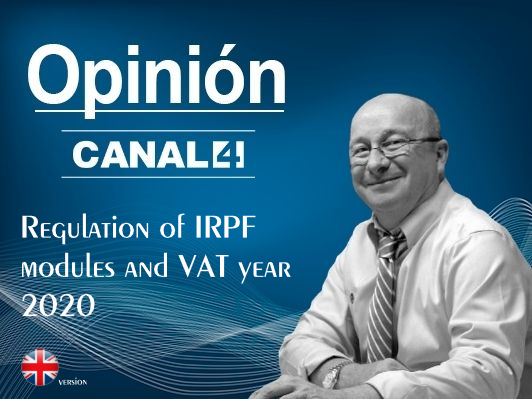Unlike previous years, self-employed workers who pay taxes in the form of tax modules, IF THEY WANT TO OPTIMISE THEIR TAX BILL, they will have to take out the calculator and count the days they have actually worked. In general, taxpayers who determine their income through the objective estimation by modules can already calculate their income tax and VAT budget for the year 2021 as of this December. Order HAC/1155/2020, of 25 November, determines the limits to be taken into account. Before starting to calculate their tax budget for the year, self-employed workers have the difficult task of correctly calculating their 2020 invoice. Atypical year due to the situation generated by the COVID 19. Therefore, they should take out the calculator and take into account the following:
- – Adjust the work variable actually worked, taking into account that the alarm state has lasted 72 days.
- – There are economic activities that have had their activity suspended beyond the alarm state.
- – Adjusting the variables that affect those signs that have to do with the capacity of the activity. Many activities have seen their capacity reduced by 50% for a long time.
- – Needless to say, those activities which have still suspended their activity, when dedicated to leisure activities.
As can be seen, this is not an easy task.
All of the above regarding personal income tax. What about VAT? The signs or modules are the same. The method for calculating the VAT due is the same, but this is not the amount you will have to pay. Self-employed workers will be able to deduct from the accrued VAT calculated by estimation all the VAT paid during the year 2020. However, it must be taken into account that the VAT paid on purchases will be lower than in previous years, and the VAT on general expenses, such as rental of business premises, will be lower due to the total or partial reduction and remission of income.
The MOYA & EMERY tax team will help you with the 2020 tax calculation, calculate the 2021 tax and analyse whether it is appropriate to waive the module method.
What about the year 2021?
On 4 December, the Ministry of Finance recently published Order HAC/1155/2020, of 25 November, which develops, for the year 2021, the method of objective estimation of Personal Income Tax and the special simplified regime of Value Added Tax: It is customary during these dates to update each year the variables to be taken into account by self-employed workers who have chosen to calculate the taxable base of their economic activity (IRPF) and the amount of VAT due that they will have to use in submitting their returns for 2021.
From our firm we are already in a position to help advisers on the variations introduced on the limits and when the option to tax by objective estimation by modules can be waived
The aforementioned order determines, as it does in 2020, the year in which the project is to be carried out:
- The amount of the signs, indices or modules, as well as the instructions for their application, in the special simplified VAT regime and objective estimate regime for personal income tax applied in the immediately preceding year.
- The 5 percent reduction in the net yield of modules (in objective estimation of personal income tax) derived from the agreements reached at the Bureau of Self-Employment.
- The reduction on the net yield calculated by the objective estimate method for personal income tax and on the quota accrued for current operations under the special simplified VAT regime for economic activities carried out in the municipality of Lorca (reduction of 20% of the net yield).
The exclusion limits for 2021 for the application of the objective assessment method are extended, while the limits for 2020 remain unchanged.
- – 250,000 for all economic activities, except agriculture, livestock and forestry, regardless of whether or not there is an obligation to issue an invoice.
- – 125,000 euros for operations for which there is an obligation to issue an invoice when the recipient is an entrepreneur.
- – EUR 250 000 for all agricultural, forestry and stockbreeding activities.
- – 250,000 euros for purchases and imports of goods and services for all business or professional activities, excluding those relating to fixed assets.
If you exceed any of these limits in 2020 you will be excluded from modules for the following three years (2021, 2022 and 2023). You can also waive (or revoke the waiver) for 2021 by submitting form 036 / 037 until 31 December 2020 or by submitting the return-settlement for the first quarter of 2021 in time by applying the direct assessment of income tax method or the general VAT system.
Follow the CANAL4DIARIO link to read the published version, here.

